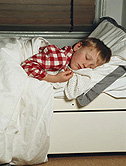- 10 Strategies to Overcome Insomnia
- Could Artificial Sweeteners Be Aging the Brain Faster?
- Techniques for Soothing Your Nervous System
- Does the Water in Your House Smell Funny? Here’s Why
- Can a Daily Dose of Apple Cider Vinegar Actually Aid Weight Loss?
- 6 Health Beverages That Can Actually Spike Your Blood Sugar
- Treatment Options for Social Anxiety Disorder
- Understanding the Connection Between Anxiety and Depression
- How Daily Prunes Can Influence Cholesterol and Inflammation
- When to Take B12 for Better Absorption and Energy
Help Your Child Get a Good Night’s Sleep


School-age children need adequate sleep for peak performance.
“Children and teens need significantly more sleep than adults to support their rapid mental and physical development,” said Dr. Clay Stallworth, a pediatrician with Georgia Regents University Health System in Augusta.
“A child’s body and brain are busy during slumber preparing for another day of tasks and growth, so it’s essential that children get the proper amount of sleep,” he said in a university news release.
School-age children should get 10 to 11 hours of sleep, according to the American Academy of Pediatrics.
One way to help kids get enough sleep is to set a regular bedtime schedule and stick with it, even on weekends. It’s also important to create a 15- to 30-minute bedtime routine to help children get ready for sleep. This might include taking a bath, dressing for bed, brushing teeth, reading a story and saying good night, Stallworth said.
Don’t let kids have chocolate, sugary foods or caffeinated beverages late in the day, he recommended. It’s also important to halt TV watching, video games and vigorous play 30 minutes or more before bedtime so that children aren’t overstimulated when it’s time to sleep, he added.
Keep a child’s bedroom dark, quiet and at a comfortable temperature, and encourage your child to fall asleep independently. It’s best to train children to do this when they’re infants, Stallworth advised.
“With a solid routine and a little discipline, you can help your children achieve sweet dreams,” he said. “And chances are, if your kids are getting a good night’s sleep, you probably will, too, and that makes for a healthier family all around.”
More information
The U.S. Centers for Disease Control and Prevention has more about sleep.
Source: HealthDay
Copyright © 2026 HealthDay. All rights reserved.










